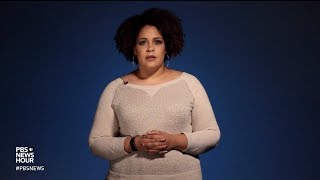JUDY WOODRUFF: Later this month, Starbucks will close its more than 8,000 coffee shops for an afternoon of anti-bias training. The aim is to raise their sensitivity of the employees around race and ethnicity, after last month's episode at a Philadelphia shop where the police were called about two black men simply sitting and waiting. Talks on the subject are always sensitive. And tonight, writer Ijeoma Oluo shares her Humble Opinion on why that talk can be so fraught, even with one's own mother.
IJEOMA OLUO, Author, "So You Want to Talk About Race": Here's the thing about my mom. My mom, who is white, is the kindest, most generous person I have ever known. But she's also exhausting. She's a bundle of whimsy and emotion, and she doesn't always think before she speaks. So, when she left me a voice-mail saying that she'd had an epiphany about race, and I should call her back right away, I really, really, really didn't want to do that. Don't get me wrong. I think I talk about race every day, as an activist and educator.
And while I had noticed that my work on race had started to build some awkward distance between my mom and me, I still didn't want to talk about race with her. I mean, she's my mom. It's personal and awkward, like talking to your mom about sex. Turns out I didn't need to worry about whether to call her back, because, like many moms, she immediately called me back, and kept calling until I answered the phone. The conversation was as bad as I had feared, maybe worse. She'd made a joke at work that had to do with race, not a racist joke, but one that was more a joke for the black community. And a black colleague had challenged her: "What do you know about being black?" Well, my mom was pretty indignant at first. "He doesn't know me. He doesn't know I raised three black kids." I was cringing as she said this to me. Had she not read my work? And then came her epiphany. She realized that her co-worker must face so much racism as a black man that he couldn't tell who the good white people were and that, if she were in his shoes, she'd probably be angry all the time too. That was this whole epiphany. She had decided that, the next day, she was going to march over to her co-worker and explain that she had raised three black kids, so she got it. I literally shouted "Nooooo," like people do in action movies when they try to stop their friends from getting into the car that is rigged with explosives. Then I took a deep breath. I tried to explain that being a white woman who loves black people, who has even given birth to black people, is still very different from living as a black person and experiencing firsthand the full force of a white society every day of your life. She asked if she at least got credit for doing black hair for all those years. I said no. It was a long conversation, and, oh, was it painful. But it opened up a new way of seeing each other. So, as awful as it was, I'm glad the conversation happened. It is in our conversations about race and racism that we find understanding, empathy, and opportunities to make real change in our day-to-day lives. Start talking. More importantly, start listening. It is not always pleasant to talk about race. In fact, it almost never is. But it is worth it.
JUDY WOODRUFF: Ijeoma Oluo.












